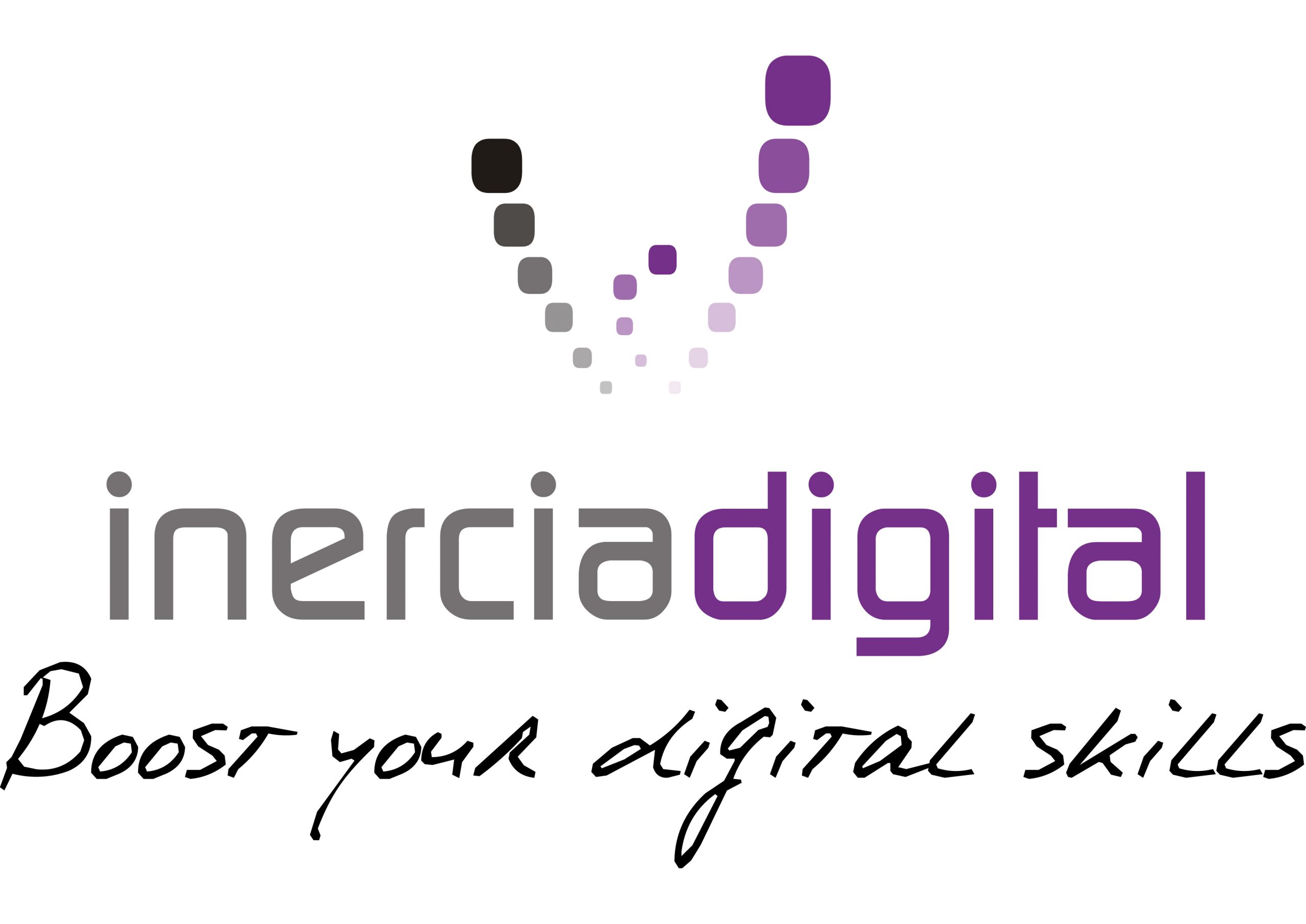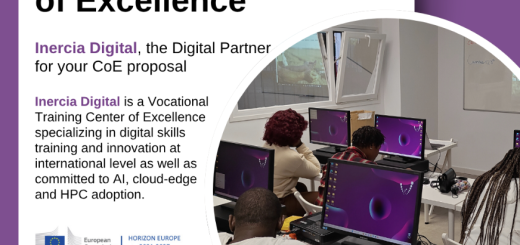Inercia Digital offers two lines of research for senior researchers / Inercia Digital ofrece dos líneas de investigación para investigadores seniors.
 Within the «Individual Fellowship» program, Inercia Digital offers two possible lines of research with the possibility of hiring postdocs.
Within the «Individual Fellowship» program, Inercia Digital offers two possible lines of research with the possibility of hiring postdocs.
The Individual Fellowship is one of the calls of H2020 and it is part of the Pillar of Excellence. The objective of this action is to enhance the creative and innovative potential of experienced researchers through individual projects with a minimum duration of one year. It is encouraging international and intersectoral mobility in universities, research centers, research infrastructures, businesses, SMEs and other socio-economic groups all over Europe and beyond.
Digital Inertia offers two lines of research related to their lines of work in European projects on which they work:
1- DIGITAL ENTREPRENEURSHIP SKILLS
Europe needs more entrepreneurs, more innovation and more high-growth SMEs. This is why it is necessary to stimulate the entrepreneurial mindsets of young people. The important role of education in promoting more entrepreneurial attitudes and behaviors is now widely recognized.
Entrepreneurship refers to an individual’s ability to turn ideas into action. It includes creativity, sense of initiative, innovation and risk-taking, as well as the ability to plan and manage projects in order to achieve objectives. The entrepreneurship competence includes therefore transversal skills and attitudes as well as more specialized knowledge and business skills. In a broad sense, entrepreneurship should be considered as a mindset that supports everyone in day-to-day life at home and in society, and provides a foundation for entrepreneurs establishing a social or commercial activity (Entrepreneurship 2020 Action Plan).
Web businesses are one of the primary creators of innovation and new jobs. The impact of web startups on economic growth and job creation will further increase as the functionalities of Internet expand. However Europe has fewer web-startups than other regions, and those tend to grow less.
This is due to:
– Insufficient web-entrepreneurial culture in Europe.
– Fragmented European web-entrepreneurial eco-system.
– Inadequate opportunities and funding for EU web startups to scale up and become leaders.
– Shortage of skilled and specifically talented web-developers and web-business professionals.
– Lack of educational programs on web entrepreneurship and innovation at universities and
secondary schools, little support and motivation for students to launch a web business.
– Lack of precise information and data about web startups ecosystem in Europe.
For this reason, we have created a programme that enhance digital skills of young people, and foster
web-entrepreneurial culture.
2- EUROPEAN DIGITAL SCHOOLS: EFFICIENT INTEGRATION OF ICT
The Survey of schools: ICT in Education, (Digital Agenda for Europe) outline how the ICT provision and use in European schools is improving but several obstacles remain.
Firstly, teachers still believe that insufficient ICT equipment is the biggest obstacle to ICT use in many countries. Secondly, whilst teachers are using ICT for preparing classes, ICT use in the classroom for learning is infrequent. Teacher training in ICT is rarely compulsory and most teachers devote spare time to private study. Thirdly, students and teachers have the highest use of ICT and ICT learning based activities when schools combine policies on ICT integration in teaching and learning. However, most schools do not have such an overarching policy. Therefore it is not surprising that teachers generally believe that there is a need for radical change to take place for ICT to be fully exploited in teaching and learning.
Despite the fact that having access and positive attitudes towards implementing ICT into their teaching and learning, teachers often find this difficult and require ongoing support not only technical but also pedagogical. For example, providing ICT coordinators in school with a role of pedagogical as well as technical guidance, or increasing the training provided by school staff and others to teachers of all disciplines. It should therefore be encouraged, including subject specific training on learning applications.
There is a need; therefore to further promote – starting with pre-service training – such online platforms and the opportunities they can afford to the European teaching community.
The Survey of Schools: ICT in Education Benchmarking Access, Use and Attitudes to Technology in Europe’s Schools recommended five policy actions:
>Strengthen public action at institutional, local, regional, national and European levels to boost ICT use at school so as to reduce the gap between ICT use out and within school.
> Increasing professional development opportunities for teachers is an efficient way of boosting ICT use in teaching and learning since it helps build highly confident and positive teachers.
>Despite having access and positive attitudes towards implementing ICT into their teaching and learning, teachers often find this difficult and require ongoing support not only technical but also pedagogical..
5 main aspects will be investigated :
- Leadership and Vision: Digital Schools of Distinction ICT strategy, and positive attitude towards ICT;
- ICT integration in the curriculum: Schools integration of ICT across the curriculum. Clear understanding of the staff on how ICT can be used to improve learning;
- School ICT culture: Schools awareness that ICT affects the quality of learning and teaching, pupil attitudes and behavior, and the school community;
- Continuing Professional Development: Schools commitment to ongoing professional development in ICT;
- Resources and infrastructure: Schools appropriate ICT resources, including hardware, software and infrastructure to support particular learning environments, and reflect plans for ICT development as outlined in the school’s policy.
For further information:
…………
Inercia Digital ofrece dos líneas de investigación para investigadores seniors.
Dentro del programa Individual Fellowship Inercia Digital ofrece dos posibles líneas de investigación con la posibilidad de contratar a investigadores postdoctorales.
La Individual Fellowship es una de las convocatorias del H2020 y se enmarca en el Pilar de Excelencia. El objetivo de esta acción es mejorar el potencial creativo e innovador de los investigadores con experiencia, a través de proyectos individuales de una duración mínima de un año. Se trata de fomentar una movilidad internacional e intersectorial en universidades, centros de investigación, infraestructuras de investigación, empresas, PYME y otros grupos socioeconómicos de toda Europa y de fuera de ella.
Inercia Digital ofrece dos líneas de investigación relacionadas con sus líneas de trabajo en los proyectos europeos en los que trabaja:
1- COMPETENCIAS EMPRESARIALES DIGITALES
Europa necesita más empresarios, más innovación y más PYME de alto crecimiento. Por esta razón es necesario estimular la mentalidad empresarial de los jóvenes. Ahora es ampliamente reconocido el importante papel de la educación en la promoción de más actitudes y comportamientos empresariales.
Espíritu empresarial consiste en la habilidad de la persona para transformar las ideas en acciones. Incluye creatividad, sentido de la iniciativa, innovación y la asunción de riesgos, así como la capacidad de planificar y gestionar proyectos con el fin de alcanzar objetivos. El espíritu empresarial incluye habilidades y actitudes transversales, así como los conocimientos y habilidades de negocios más especializados.
En un sentido amplio, el espíritu empresarial debe considerarse como un modo de pensar que apoya a todos en la vida del día a día en el hogar y en la sociedad, y proporciona una base para los empresarios al establecer una actividad social o comercial (Plan de Acción de Emprendimiento, 2020).
Las empresas web son uno de los principales creadores de innovación y nuevos puestos de trabajo. El impacto de las nuevas empresas de Internet en el crecimiento económico y la creación de empleo aumentará aún más así como las funcionalidades de Internet se expanden. Sin embargo Europa tiene menos creaciones web que otras regiones, y éstos tienden a crecer menos.
Esto se debe a:
– Insuficiente cultura emprendedora en la web en Europa.
– Ecosistema emprendedor en la web europeo fragmentado
– Oportunidades y financiación de creación web de la UE inadecuados para convertirse en líderes.
– La escasez de los desarrolladores web calificados y con talentos específicos y profesionales del negocio web.
– La falta de programas educativos sobre el espíritu empresarial y la innovación web de las universidades y escuelas secundarias, poco apoyo y motivación de los estudiantes para poner en marcha un negocio en la Web.
– La falta de información y datos precisos sobre el ecosistema de creaciones web en Europa.
Por esta razón hemos creado un programa que mejora las habilidades digitales de los jóvenes y la cultura emprendedora en la web.
2- ESCUELAS DIGITALES EUROPEAS: INTEGRACIÓN EFICIENTE DE LAS TIC
La Encuesta de escuelas: las TIC en Educación, (Proyecto Digital Europeo) describen cómo la provisión y uso de TIC en las escuelas europeas ha mejorado, pero sigue habiendo algunos obstáculos.
En primer lugar, los profesores siguen creyendo que el insuficiente equipamiento de las TIC es el mayor obstáculo para su uso en muchos países. En segundo lugar, mientras que los profesores las utilizan para preparar las clases, el uso de las TIC en el aula para el aprendizaje es poco frecuente. La formación del profesorado en TIC es raramente obligatoria y la mayoría de los profesores dedican tiempo libre al estudio privado. En tercer lugar, los estudiantes y los profesores tienen el mayor uso de las TIC y actividades de aprendizaje basado en las TIC en las escuelas que combinan políticas de integración en la enseñanza y el aprendizaje. Sin embargo, la mayoría de las escuelas no tiene una política de carácter global. Por lo tanto no es de extrañar que los profesores en general crean que hay una necesidad de cambio radical para que las TIC sean explotadas plenamente en la enseñanza y el aprendizaje.
A pesar del hecho de tener acceso y actitudes positivas hacia la implementación de las TIC en la enseñanza y el aprendizaje, los maestros suelen verlo difícil y requieren apoyo permanente y no sólo técnico, sino también pedagógico. Por ejemplo, ofreciendo coordinadores TIC en la escuela con un papel pedagógico, así como orientación técnica, o un aumento de la formación impartida por personal de la escuela para los profesores de todas las disciplinas. Debería entonces fomentarse, incluyendo la formación específica en aplicaciones de aprendizaje.
Por lo tanto son necesarias, para promover aún más – empezando por la formación previa al servicio – estas plataformas en línea y las oportunidades que puedan permitirse a la comunidad educativa europea.
La Encuesta de Escuelas: Las TIC en la Comparativa de Evaluación Educacional del Acceso, Uso y Actitudes sobre Tecnología en las Escuelas de Europa recomienda cinco acciones de política:
> Fortalecer la acción pública a nivel institucional, local, regional, nacional y europeo para impulsar el uso de las TIC en la escuela a fin de reducir la brecha entre el uso de las TIC fuera y dentro de la institución.
> Aumentar las oportunidades de desarrollo profesional para los profesores es una forma eficiente de impulsar el uso de las TIC en la enseñanza y el aprendizaje, ya que ayuda a construir maestros altamente seguros y positivos.
> A pesar de tener acceso y actitudes positivas hacia la implementación de las TIC en la enseñanza y el aprendizaje, los profesores suelen ver la situación difícil y requieren apoyo continuo no sólo técnico, sino también pedagógico.
Se investigarán cinco aspectos principales:
- Liderazgo y Visión: Escuelas Digitales de estrategia de Distinción TIC, y actitud positiva hacia éstas.
- Integración de las TIC en el currículo: la integración de las TIC en el plan de estudio escolar. Un claro entendimiento del personal sobre cómo las TIC pueden utilizarse para mejorar el aprendizaje.
- Cultura Escolar TIC : Escuelas con conciencia de que las TIC afectan a la calidad del aprendizaje y la enseñanza, las actitudes y el comportamiento de los alumnos y la comunidad escolar.
- Formación Continua: Escuelas comprometidas con el desarrollo profesional continuo en las TIC.
- Recursos e infraestructura: Escuelas con recursos TIC adecuados, incluyendo hardware, software e infraestructura para soportar entornos de aprendizaje particulares y que reflejen los planes de desarrollo de las TIC como se indica en la política de la escuela.
Para más información:
Carlos Luna
Latest posts by Carlos Luna (see all)
- Curso ka1 en Čakovec (Croacia) / Ka1 course in Čakovec (Croacia) - 07/08/2023
- Evento de difusión del proyecto Erasmus+ 3D Digital VET celebrado en Huelva// Dissemination event of the Erasmus+ 3D Digital VET project in Huelva - 20/12/2022
- Quinto Encuentro del Proyecto Europeo Erasmus+ QUASER en Estocolmo/ Fifth Transnational Meeting of the QUASER European Project in Stockholm - 02/07/2019




